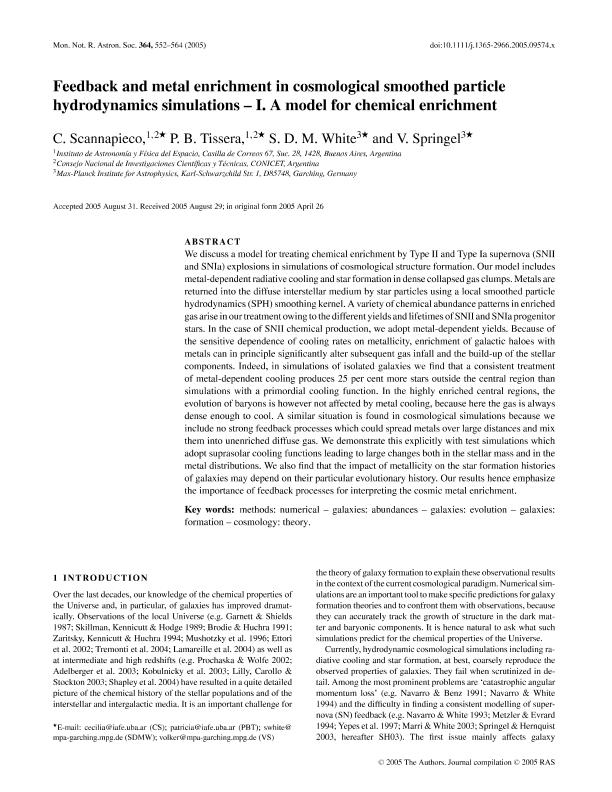Mostrar el registro sencillo del ítem
dc.contributor.author
Scannapieco, Cecilia

dc.contributor.author
Tissera, Patricia Beatriz

dc.contributor.author
White, S. D. M.
dc.contributor.author
Springel, V.
dc.date.available
2017-08-08T19:43:13Z
dc.date.issued
2005-12
dc.identifier.citation
Scannapieco, Cecilia; Tissera, Patricia Beatriz; White, S. D. M.; Springel, V.; Feedback and metal enrichment in cosmological smoothed particle hydrodynamics simulations - I. A model for chemical enrichment; Oxford University Press; Monthly Notices of the Royal Astronomical Society; 364; 2; 12-2005; 552-564
dc.identifier.issn
0035-8711
dc.identifier.uri
http://hdl.handle.net/11336/22053
dc.description.abstract
We discuss a model for treating chemical enrichment by Type II and Type Ia supernova (SNII and SNIa) explosions in simulations of cosmological structure formation. Our model includes metal-dependent radiative cooling and star formation in dense collapsed gas clumps. Metals are returned into the diffuse interstellar medium by star particles using a local smoothed particle hydrodynamics (SPH) smoothing kernel. A variety of chemical abundance patterns in enriched gas arise in our treatment owing to the different yields and lifetimes of SNII and SNIa progenitor stars. In the case of SNII chemical production, we adopt metal-dependent yields. Because of the sensitive dependence of cooling rates on metallicity, enrichment of galactic haloes with metals can in principle significantly alter subsequent gas infall and the build-up of the stellar components. Indeed, in simulations of isolated galaxies we find that a consistent treatment of metal-dependent cooling produces 25 per cent more stars outside the central region than
simulations with a primordial cooling function. In the highly enriched central regions, the evolution of baryons is however not affected by metal cooling, because here the gas is always dense enough to cool. A similar situation is found in cosmological simulations because we include no strong feedback processes which could spread metals over large distances and mix them into unenriched diffuse gas. We demonstrate this explicitly with test simulations which adopt suprasolar cooling functions leading to large changes both in the stellar mass and in the
metal distributions. We also find that the impact of metallicity on the star formation histories of galaxies may depend on their particular evolutionary history. Our results hence emphasize the importance of feedback processes for interpreting the cosmic metal enrichment.
dc.format
application/pdf
dc.language.iso
eng
dc.publisher
Oxford University Press

dc.rights
info:eu-repo/semantics/openAccess
dc.rights.uri
https://creativecommons.org/licenses/by-nc-sa/2.5/ar/
dc.subject
Methods:Numerical
dc.subject
Galaxies:Abundances
dc.subject
Galaxies:Evolution
dc.subject
Galaxies:Formation
dc.subject
Cosmology:Theory
dc.subject.classification
Astronomía

dc.subject.classification
Ciencias Físicas

dc.subject.classification
CIENCIAS NATURALES Y EXACTAS

dc.title
Feedback and metal enrichment in cosmological smoothed particle hydrodynamics simulations - I. A model for chemical enrichment
dc.type
info:eu-repo/semantics/article
dc.type
info:ar-repo/semantics/artículo
dc.type
info:eu-repo/semantics/publishedVersion
dc.date.updated
2017-08-08T14:32:14Z
dc.journal.volume
364
dc.journal.number
2
dc.journal.pagination
552-564
dc.journal.pais
Reino Unido

dc.journal.ciudad
Londres
dc.description.fil
Fil: Scannapieco, Cecilia. Consejo Nacional de Investigaciónes Científicas y Técnicas. Oficina de Coordinación Administrativa Ciudad Universitaria. Instituto de Astronomía y Física del Espacio. - Universidad de Buenos Aires. Facultad de Ciencias Exactas y Naturales. Instituto de Astronomía y Física del Espacio; Argentina
dc.description.fil
Fil: Tissera, Patricia Beatriz. Consejo Nacional de Investigaciónes Científicas y Técnicas. Oficina de Coordinación Administrativa Ciudad Universitaria. Instituto de Astronomía y Física del Espacio. - Universidad de Buenos Aires. Facultad de Ciencias Exactas y Naturales. Instituto de Astronomía y Física del Espacio; Argentina
dc.description.fil
Fil: White, S. D. M.. Gobierno de la Republica Federal de Alemania. Max Planck Institut Fur Astrophysik; Alemania
dc.description.fil
Fil: Springel, V.. Gobierno de la Republica Federal de Alemania. Max Planck Institut Fur Astrophysik; Alemania
dc.journal.title
Monthly Notices of the Royal Astronomical Society

dc.relation.alternativeid
info:eu-repo/semantics/altIdentifier/url/http://mnras.oxfordjournals.org/content/364/2/552
dc.relation.alternativeid
info:eu-repo/semantics/altIdentifier/doi/http://dx.doi.org/10.1111/j.1365-2966.2005.09574.x
Archivos asociados
